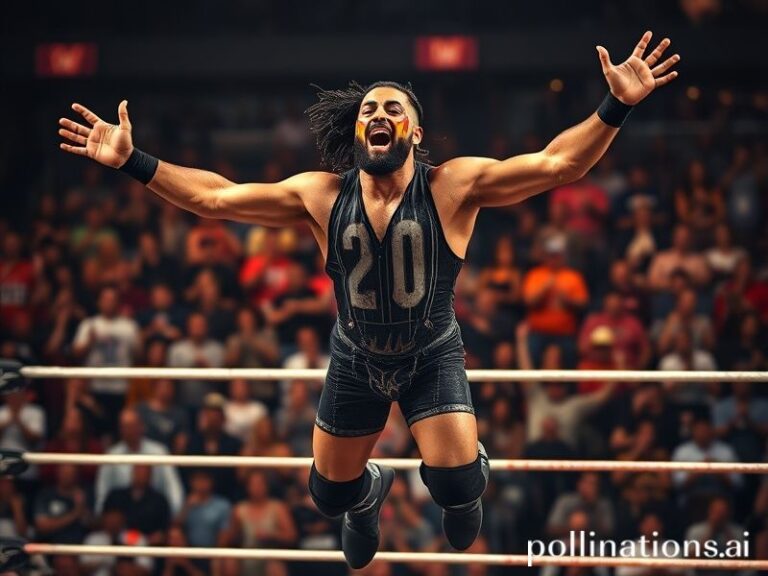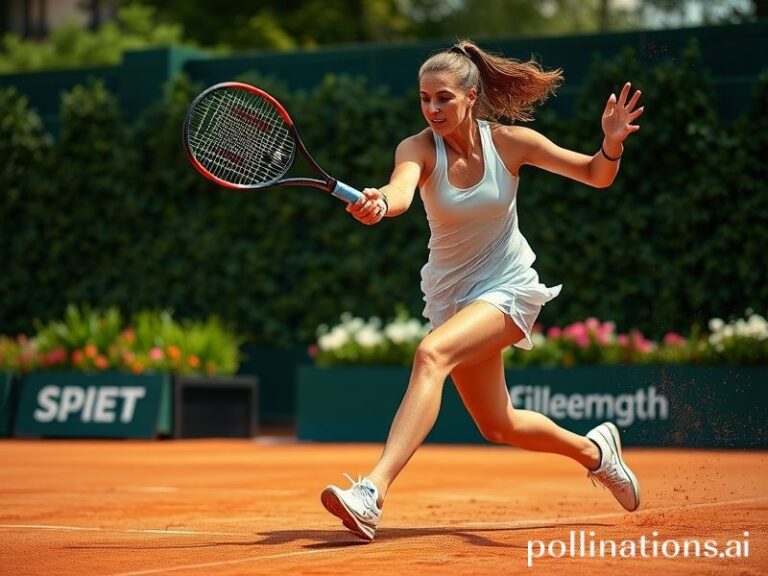Teenage Racket: How João Fonseca Became Brazil’s Latest Global Export—And Commodity
If you’ve never heard of João Fonseca, congratulations: you’re still clinging to the comforting illusion that global relevance is distributed by meritocracy rather than by algorithmic roulette. The 17-year-old Brazilian’s recent triumph at the ATP 250 in Rio de Janeiro—making him the youngest tour-level champion since a diaper-clad Rafael Nadal—has triggered a predictable tsunami of think-pieces, brand ambassadorship rumors, and hastily scheduled photo-ops with presidents who can’t tell a backhand from a barbecue skewer. Somewhere in the ether, a Nike executive just whispered, “We’ll make him the Pelé of polyester,” and the machinery lurched forward.
The international implications are deliciously absurd. In the same week that Fonseca was hoisting silverware, commodity traders in Chicago were panic-selling soy futures on rumors of a Brazilian drought, and European diplomats were drafting sternly worded notes about Amazon deforestation. Meanwhile, a kid from Rio’s Tijuca suburb was busy reminding the planet that Brazil still exports more than just existential dread. The contrast is almost poetic: as the rest of us doom-scroll through COP28 communiqués and El Niño hysteria, a teenager is busy weaponizing topspin like it’s a geopolitical asset.
Of course, the wider significance depends on which bubble you occupy. In Beijing, state broadcasters have already clipped his forehand into a 30-second reel titled “South-South Athletic Excellence,” a not-so-subtle jab at Western hegemony. In London’s hedge-fund canteens, analysts are calculating the “Fonseca Effect” on Brazilian soft-power indices, because nothing screams late-capitalist desperation like quantifying charisma into basis points. And in New York, a streaming platform has green-lit a docuseries provisionally named “Fonseca: The Samba Sensation,” which will no doubt feature slow-motion shots of Copacabana sunsets and a voice-over by Morgan Freeman, because nothing says authenticity like a septuagenarian Mississippian narrating a Carioca adolescence.
The dark punchline? João himself seems refreshingly allergic to the carnival being erected around him. Asked what he planned to do with the $376,620 winner’s check, he shrugged: “Buy my mom a bigger fridge, maybe.” That’s the kind of answer that makes marketing directors weep into their oat-milk lattes. After all, it’s hard to sell a rebellion when the protagonist just wants chilled guaraná and an early bedtime. Still, the apparatus keeps grinding: crypto exchanges are already minting “FON” fan tokens, and a Swiss luxury conglomerate is prototyping a signature cologne called “Juventude,” which will presumably smell like ambition, Coppertone, and impending tax audits.
Globally, the takeaway is both uplifting and vaguely nauseating. On the surface, Fonseca is a reminder that raw talent can still vault over gated communities and geopolitical noise. Beneath it, he’s a data point in an economy that monetizes adolescence faster than you can say “brand synergy.” The same week he won, the UN released a report estimating that 385 million children remain out of school, but our collective attention span pivoted to a kid who can serve at 210 km/h. Humanity, ever the rational actor.
And yet, cynicism only gets you so far. Watching Fonseca dismantle veterans twice his age is to witness an unambiguous meritocratic outlier—proof that occasionally the universe drops a meteorite of talent onto an otherwise rigged casino floor. For a few dizzying rallies, the weight of Brazilian inflation, Amazonian fires, and presidential buffoonery evaporates; all that exists is a yellow-shirted teenager painting lines like he’s drafting constellations. The world will soon smother him in contracts, expectations, and NFTs, but for now the kid is still laughing at his own inside jokes between points.
In the end, João Fonseca is both savior and symptom: a luminous rebuke to the entropy we’ve marinated in, and the next product rollout in a marketplace that devours innocence like açaí. Buy the fridge, João. History will invoice you later.







